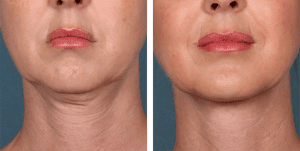Kybella (deoxycholic acid) is a new FDA-approved non-invasive treatment for moderate to severe submental fullness, more commonly known as a double chin. As with any new medical procedure, it is important to be aware all safety information, side effects and potential health issues associated with this body contouring treatment.
 “Most of this is common sense,” explains Dr. Adam Mamelak, board-certified dermatologist at Sanova Dermatology in Austin, Texas. Dr. Mamelak advises only undergoing treatment with a trained and experienced healthcare professional. Patients shouldn’t be have an active infection in the area of the neck being treated. As well, to avoid tissue damage, your physician should steer clear of any vital anatomic structures.
“Most of this is common sense,” explains Dr. Adam Mamelak, board-certified dermatologist at Sanova Dermatology in Austin, Texas. Dr. Mamelak advises only undergoing treatment with a trained and experienced healthcare professional. Patients shouldn’t be have an active infection in the area of the neck being treated. As well, to avoid tissue damage, your physician should steer clear of any vital anatomic structures.
Deoxycholic acid is a natural substance found in our digestive tracks. It’s function is to break down fat in the body. When injected into localized fat collections, such as a double chin, it dissolves and dissipates the fat cells in this area, permanently.
“There were a few cases of nerve damage in the Kybella clinical trials,” says Dr. Mamelak. In fact, there were 4 cases of marginal mandibular nerve damage in all the trials. This nerve travels along the jawline above the submental fat pad, and it was thought that these patients suffered injury from injections outside of the recommended treatment field. “A very small number of patients complained asymmetric smiles and facial muscle weakness as a result. Thankfully, all of these cases resolved spontaneously with no-long term, permanent effect.” Kybella should not be injected in proximity of the submental nerve. Similarly, it should not be injected into lymph nodes, salivary glands or muscles to avoid tissue damage.
The most common side effects reported of Kybella include swelling and edema within the treated area, pain, bruising, numbness, and redness. It is recommended that any discomfort can effectively be managed with ibprofen. Patients with difficulty swallowing (dysphagia) should not use Kybella. “The swelling in the area could potentially make this worse, so it’s best avoided altogether,” explains Dr. Mamelak.
Contact Us
If you have questions about Kybella, or are interested in treatments for neck and facial rejuvenation, please contact us at Sanova Dermatology today!
Join Us
